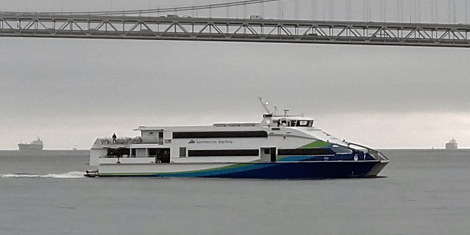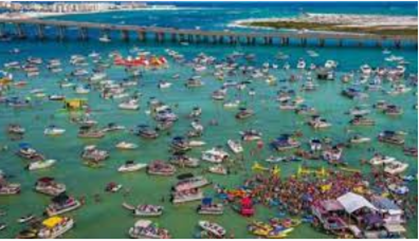The Maritime Attorney
Other Attorneys Recommend
WHAT ARE “NAVIGABLE WATERS” AND HOW DOES SUCH AFFECT PASSENGERS’ CASES WHETHER IN FLORIDA OR CALIFORNIA.
Destin, FL August 8, 2022 – tour boat passenger allegedly thrown from bow by large wave, sustains sever injury by propeller strike in Choctawhatchee Bay.
Oakland, CA August 15, 2022. Ferry passenger allegedly jumps into San Francisco Bay never to be seen again.
These two events occurred upon “navigable waters” of the United States


”Navigable waters” is a technical term with regulatory definition under the Code of Federal Regulations relative
to the authority of the United States Army Corps. of Engineers. See, 33 CFR, Part 329 - Definition Of Navigable
Waters Of The United States. The general definition is:
Navigable waters of the United States are those waters that are subject to the ebb and flow
of the tide and/or are presently used, or have been used in the past, or may be
susceptible for use to transport interstate or foreign commerce. A determination of
navigability once made, applies laterally over the entire surface of the waterbody,
and is not extinguished by later actions or events
which impede or destroy navigable capacity.
33 CFR, §329.4; see, for context, 33 CFR, §329.1. Other statutory or regulatory definitions exist. For instance,
The Navigable Waters Protection Rule: Definition of “Waters of the United States,” 85 Fed. Reg. 22250–01
(April 21, 2020). Such are not germane to this discussion.
The concept of “Navigable Waters” in the general maritime law is more narrowly defined. For instance:
For admiralty purposes, the concept of "navigability" is generally understood to describe
"a present capability of waters to sustain commercial shipping," or "contemporary navigability
in fact," Livingston v. United States, 627 F.2d 165, 169-70 (8th Cir. 1980). See also
Kaiser Aetna v. United States, 444 U.S. 164, 171-72, 62 L. Ed. 2d 332, 100 S. Ct. 383 [**23]
(noting the varying definitions of "navigable waters" for different contexts);
The Robert W. Parsons, 191 U.S. 17, 26, 48 L. Ed. 73, 24 S. Ct. 8 (1903)("the modern doctrine"
is that "the actual navigability of the waters[] is the test of jurisdiction")
Cunningham v. Dir., OWCP, 377 F.3d 98, 108 (1st Cir. 2004).
Although state law may regulate ferries as common carriers, or tour boats as livery, any personal
injury, estate’s survival or wrongful death claims arising from vessel operations-connected will be
controlled by the general maritime law.
The [United States] District Court was in error in ruling that the governing law in this case
was that of the State of New York. Kermarec was injured aboard a ship upon navigable waters.
It was there that the conduct of which he complained occurred. The legal rights and liabilities
arising from that conduct were therefore within the full reach of the admiralty jurisdiction and
measurable by the standards of maritime law.
Kermarec v. Compagnie Générale Transatlantique, 358 U.S. 625, 628 (1959).
Even in state court-based law suits, admiralty caselaw and federal regulations applicable to the circumstances of
loss will be applied instead of state caselaw or state regulations. California court: Schlessinger v. Holland Am.,
120 Cal. App. 4th 552, 557, 16 Cal. Rptr. 3d 5, 9 (2004). Florida court: Nicoll v. Magical Cruise Co., 110 So. 3d 98, 99
(Fla. Dist. Ct. App. 2013).
There are exceptions, which may arise such as when the death occurs within three nautical miles of U.S. territory.
See, Yamaha Motor Corp., U.S.A. v. Calhoun, 516 U.S. 199 (1996)[State law may expand roster of whom may claim].
Additionally, courts may apply state law regulations to marine insurers when such does not interfere with
established admiralty law or the need for nationwide uniformity of law. Wilburn Boat Co. v. Fireman’s Fund
Insurance Co., 348 U.S. 310, 75 S. Ct. 368, 99 L. Ed. 337, 1955 A.M.C. 467 (1955).
What duty does a vessel owner or operator owe to the passenger? The answer is:
We hold that the owner of a ship in navigable waters owes to all who are on board
for purposes not inimical to his legitimate interests the duty of exercising reasonable
care under the circumstances of each case.
Kermarec v. Compagnie Generali Transatlantique, 358 U.S. supra, at 632; emphasis added. In some instances
being aboard a vessel can be the same experience as being ashore (e.g., ballrooms) while walking down a shaky
gangway is much different that walking out of a ballroom.
Therefore, “under the circumstances” results in vast caselaw. A discussion for another day.
This entry has been created for information and planning purposes.
It is not intended to be, nor should it be substituted for, legal
advice, which turns on specific facts.


